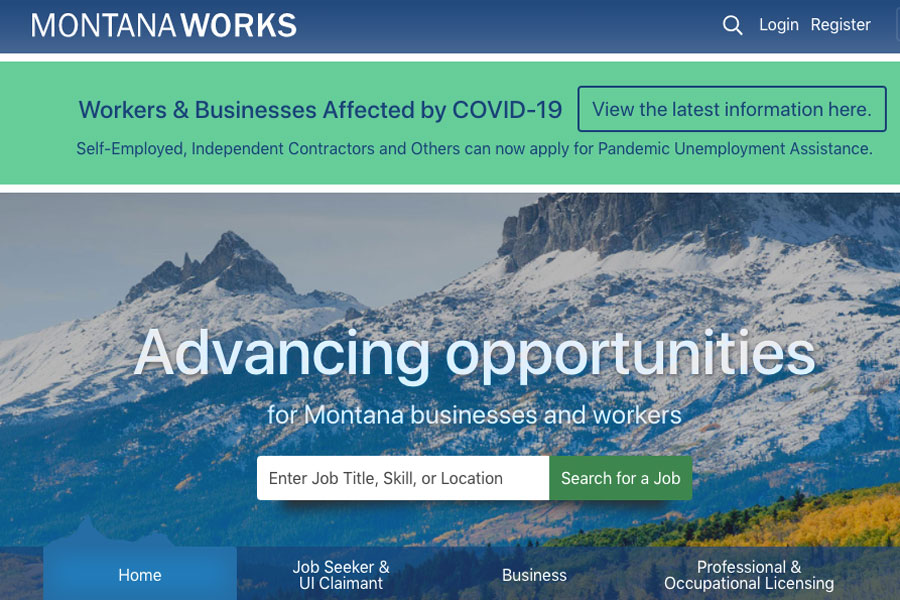Labor Department Works to Combat Unemployment Fraud
State seeking to recover millions of dollars in fraudulent claims; residents whose stolen information was involved in scheme voice concerns over identity theft
By Myers Reece
The Montana Department of Labor and Industry says it’s increasing identity-verification measures to combat a “sophisticated national unemployment fraud scheme” while working to recover millions of dollars already paid out in fraudulent unemployment insurance claims.
The labor department said it has paid out more than $10 million in possible fraudulent unemployment claims during the pandemic, although it said it has prevented more than $220 million in fraudulent payments since April 28.
The scheme uses stolen personal information to apply for benefits, at a time when millions of Americans and thousands of Montanans have found themselves either unemployed or underemployed due to COVID-19. Other states have reported paying out hundreds of millions of dollars in fraudulent claims.
In addition to implementing additional identity-verification measures, the state labor department has quadrupled the staff on its unemployment insurance fraud investigation unit and is “aggressively using data analytics to cross-match potential fraudulent information” with other state agencies, the National Association of State Workforce Agencies Integrity Center and other states.
“Through additional steps taken to prevent fraud, we’ve been able to stop this widespread scheme to take advantage of the pandemic,” acting Labor Commissioner Brenda Nordlund said. “While we have successfully prevented a large amount of fraud up to this point, we are continuing our efforts to stop fraud from occurring while ensuring all eligible Montanans receive the benefits they deserve.”
Two Flathead Valley residents whose information was stolen said they have been in contact with the state labor department, which shut down the fraudulent accounts in their names, and expressed worry over their personal information, including Social Security numbers, in the hands of unknown people using it for nefarious purposes.
One of the residents, who asked not to be named, said she received a letter in late May from the labor department regarding her pandemic unemployment insurance benefits, although she never applied. She eventually learned that someone using her Social Security number and posing as her had applied for the benefits and had nearly $7,000 in payments deposited in a credit union in Colorado.
She called the credit union to make sure there wasn’t an account opened in her name, changed all of her passwords and put a freeze on her credit. She said she was “disturbed” by the exposure of her Social Security number, as well as her name, address and date of birth, and asked the labor department for a copy of the application to see what other personal information may be vulnerable but has not yet been able to view it.
“I’ve never dealt with identity theft before,” she said. “I’m trying to figure it out. If there’s any other information out there tied to my name somehow, I’d like to know what that is.”
Another Kalispell resident, who also asked not to be named, received a letter stating that she had qualified for pandemic unemployment insurance. She is retired and never applied for benefits, but discovered through the labor department that someone was using her Social Security number to file unemployment claims.
She said the Social Security office told her it’s not possible to issue a new number and recommended that she watch her financial accounts closely. She filed a police report and changed the security settings on her credit card and bank accounts, but still feels uneasy about potential uses of her information.
“As far as I can tell, nothing has been taken from me,” she said, adding that she has “no idea where they would have gotten my Social Security number.”
The state labor department said it has experienced a significant rise in unemployment fraud since mid-May involving the use of “stolen personal information from external data breaches.” The department is working with law enforcement, the U.S. Office of the Inspector General and banking institutions to coordinate the recovery of fraudulent payments.
Nordlund noted that the state’s heightened identity-verification measures may require applicants to provide more information and lead to temporary delays in payment.
“We believe these steps are necessary to respond to this unemployment scam,” Nordlund said. “We are working rapidly to respond to this scheme and urge individuals who may have had a false unemployment claim filed in their name to contact the Department.”
On May 14, the U.S. Secret Service warned of a “massive” unemployment scheme perpetuated by a “well-organized Nigerian fraud ring exploiting the COVID-19 crisis.” The Secret Service said it was “extremely likely every state is vulnerable to this scheme and will be targeted if they have not been already.”
The fraud shut down the state of Washington’s unemployment system for two days in May. Washington has reported making up to $650 million in fraudulent payments while recovering at least $330 million, as of earlier this month. Other hard-hit states have been scrambling to stem the tide of fraudulent claims, including Michigan Attorney General Dana Nessel announcing an unemployment insurance fraud task force earlier this month that includes a range of state and federal authorities.
“To steal money from this program intended to support households during a major global crisis is beyond reprehensible,” Nessel said on June 5.
According to news reports from around the country, the states’ aggressive actions have been broadly successful in identifying suspicious claims, although the efforts have also halted or delayed payments to legitimate out-of-work applicants.
The Montana Department of Labor and Industry has established a public phone line for unemployment fraud at 1-888-556-4677. Labor officials ask that any suspected fraud be reported immediately to http://uid.dli.mt.gov/report-fraud.